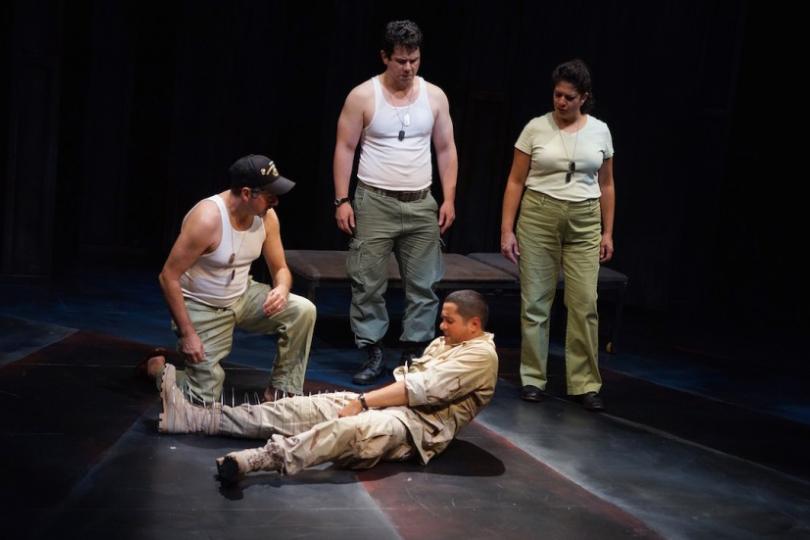A multi-character study named Eliot

Not so long ago I tended to go into shows about the military expecting variations on the same anti-war messages I’d seen played out dozens of times before. No matter how much I sympathized with the viewpoint, it was hard to get past the feeling of familiarity and choir-preaching endemic to the genre. Within the past decade or so, though, artistic depictions of the military seem to be trending away from cataloging the horrors of war and focusing more on the human experience. Now sober, largely apolitical observations of servicepeople dealing with life during and after wartime are in vogue, to the point that such sympathetic, blue-collar takes have become almost a cliche unto themselves.
In its early going, Park Square’s production of Elliot, A Soldier’s Fugue feels like another link in that chain, a well-written, well-meaning but somewhat redundant reminder that soldiers are people too. As the play progresses, though, it becomes evident that there’s more to Elliot than its genre-mates might lead you to expect.
What sets Elliot apart is how deeply its various stories are defined by the teller’s point-of-view. While this is ostensibly the narrative of several generations of a military family, the characters very rarely interact with each other, or at least very rarely speak directly to each other. A typical scene finds one actor relating a character’s wartime experience while the other actors deliver stage directions and play out the action being described. Sometimes the description comes from a different angle, with one character reading out loud a letter or diary entry while the writer reenacts the drama within.
Handled with less grace, this approach could come off passive, but Robert Rosen’s direction keeps all four actors constantly engaged. Sometimes that works to harrowing effect, notably in a sequence where several characters act out a relatively calm vignette while another writhes unacknowledged in the foreground after sustaining an agonizing battle wound.
The family and the individual
This fractured structure allows the action to move freely across time and space while giving the play’s underlying theme room to incubate. Throughout much of Elliot I wondered why it was titled Elliot. The play is presented as an entire family’s experience with military service across several generations. Quiarea Algera Hudes’s script gives equal footing to each of the four family members, allowing Elliot and his grandfather, mother and father roughly equivalent time to tell his or her story.
But there’s a reason this play isn’t called The Ortiz Family. As the interwoven-monologue structure makes clear, each person’s experience with war is unique. There are tremors that are felt throughout the family, yes, but each story presented here clearly belongs to its teller. The other family members know only bits and pieces, and even the audience may not be privy to the whole picture. Elliot’s narrative may not bear any more weight than those of the other veterans here, but as the youngest member of the family, his story is the culmination of those that have gone before. For better or for worse, war has helped shape this family, and ultimately Elliot, into what they are. It’s an uneasy relationship, but that seems to be the only kind the Ortiz family knows.
Each generation’s war
That family dynamic is the other key piece of the puzzle, and another area where it’s evident that the characters may not know as much about themselves or each other as they believe they do. Hudes does a keen job of differentiating between each generation’s reaction to war and how those various responses reverberate across the decades. The ailing patriarch (Rich Remedios) treats his Korean War service as a closed chapter in his life, something to be recalled mainly through ribald anecdotes and well-worn platitudes. His progeny (Pedro R. Bayon) is similarly closed-off about his time in Vietnam, but in his case it’s because he spends his days trying to drink away the trauma of his service.
His wife (an intoxicatingly buoyant Adlyn Carreras) views her days as an Army nurse with a certain romantic nostalgia for a time when she could project her overbrimming nurturing instincts onto all manner of suffering young men. Meanwhile, her own suffering young man Elliot (Ricardo Vazquez, seething with unharnessed masculinity) seems to hate everything about war and Army life but keeps re-upping because he has no idea what else to do with himself. The family members are ironically separated by their own common ground, a division reinforced by the way the actors move in tight orbits around each other even as meaningful human connections stay mostly out of reach.
As well as that separation works, it also contributes to my main problem with Elliot. With each character so deeply embedded in his or her own experience, it’s sometimes difficult to connect with the play as a viewer. The vignettes themselves pack a punch, but they never quite cohere into a whole. Given the subject and the structure, that may be part of the point - lord knows it’s preferable to trying to graft the characters’ wartime experiences onto some grand political statement - but ultimately it renders Elliot as an intriguing exercise in multi-character study rather than the powerful portrait of men and women at war that it frequently hints at becoming.
As it stands, it’s an affecting, inventive production that’s well worth your time even if it’s not imperative to your experience.




